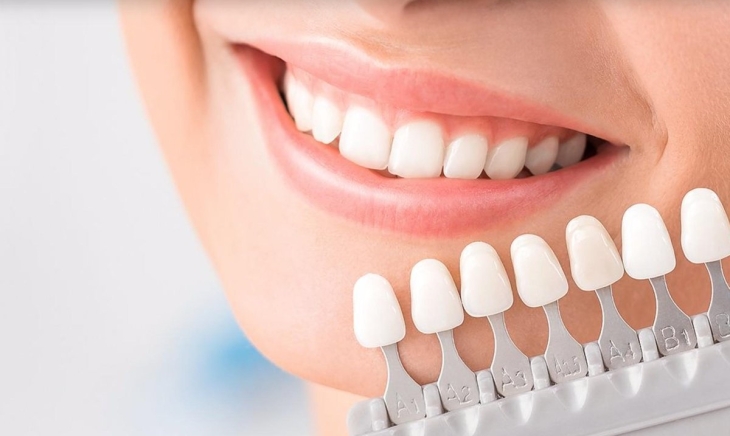Types of Veneers and Their Pros and Cons
Veneers are thin shells of material, often made from porcelain or composite resin, that are placed on the front surface of teeth to improve appearance. They are commonly used to address issues like discoloration, gaps, chips, and misalignment. Below is a detailed explanation of the different types of veneers, along with their advantages and disadvantages.
Types of Veneers
1. Porcelain Veneers
- Material: These are made from high-quality ceramic material, providing a natural and durable solution for cosmetic dental needs.
- Appearance: They are highly aesthetic, mimicking the look of natural teeth, and are resistant to staining.
- Durability: Porcelain veneers are strong and long-lasting, typically lasting 10 to 15 years with proper care.
- Customization: They are highly customizable in terms of color, shape, and size, making them ideal for achieving a natural look.
2. Composite Resin Veneers
- Material: These are made from a tooth-colored resin material, which is applied directly to the teeth and sculpted into place.
- Appearance: While they can look natural, composite veneers are not as translucent as porcelain and might not mimic natural teeth as well.
- Durability: Composite veneers are less durable than porcelain and may need to be replaced more frequently (typically 5 to 7 years).
- Customization: They are easier and quicker to apply, but they may not offer the same range of aesthetic results as porcelain veneers.
3. Lumineers
- Material: Lumineers are a brand of ultra-thin porcelain veneers that require minimal or no tooth preparation before application.
- Appearance: They offer a natural and shiny appearance but may not be as effective at masking severe dental imperfections as traditional veneers.
- Durability: Lumineers can last up to 10 years, but their thinness makes them prone to chipping in some cases.
- Customization: While they are easier to apply and require less removal of natural tooth structure, Lumineers might not be as customizable as thicker porcelain veneers.
4. Prepless Veneers
- Material: These are a variation of porcelain veneers that don’t require any removal of the tooth structure, making them a non-invasive option.
- Appearance: They are also aesthetically pleasing but may not be suitable for severe dental issues.
- Durability: Prepless veneers are less durable than traditional porcelain veneers, and their lifespan may be shorter.
- Customization: Limited customization due to the lack of tooth preparation, but they are still a great option for mild aesthetic improvements.
Pros of Veneers
1. Aesthetic Improvement: Veneers can significantly improve the appearance of teeth, enhancing their color, shape, and size.
2. Stain Resistance: Porcelain veneers, in particular, are highly resistant to stains from coffee, tea, and smoking, helping to maintain a brighter smile.
3. Durability: High-quality porcelain veneers are long-lasting and can endure daily wear and tear for many years with proper care.
4. Minimally Invasive: Some types of veneers, like Lumineers or Prepless veneers, require little to no removal of natural tooth structure, making them a less invasive option compared to other dental treatments.
5. Quick Results: Veneer treatments are faster than alternatives like orthodontics (braces) or crowns, providing immediate cosmetic benefits.
Cons of Veneers
1. Cost: Veneers, particularly porcelain ones, can be quite expensive. The cost varies depending on the material and the number of veneers required.
2. Irreversibility: Once applied, veneers are permanent. If they are damaged or need to be replaced, it usually involves additional procedures.
3. Tooth Sensitivity: The process of applying veneers can cause temporary sensitivity, especially with porcelain veneers, as some enamel is removed during preparation.
4. Risk of Damage: While durable, porcelain veneers can chip or crack if subjected to excessive force, like biting on hard objects or grinding teeth.
5. Limited Coverage: Veneers are typically used for cosmetic purposes and may not be suitable for addressing severe dental issues like deep decay or large cavities.
6. Not a Permanent Solution: Over time, veneers may need to be replaced, especially if they become damaged or worn down.
Conclusion
Veneers are a highly effective cosmetic solution for improving the appearance of teeth. They come in various types, including porcelain, composite resin, Lumineers, and prepless veneers, each with its own set of pros and cons. The decision on which type of veneer to choose depends on individual preferences, the degree of cosmetic improvement needed, and the budget. Consulting with a dentist can help determine the most suitable option for your needs.
First Elite Medical Center offers a wide range of specialized services in the field of veneers, which are a popular cosmetic dental solution for enhancing the appearance of teeth.
Here are some of the services they may provide in this area:
1. Consultation and Assessment: A comprehensive consultation is provided to evaluate the patient's dental health and aesthetic needs. The dentist will determine if veneers are the best option based on the shape, color, and condition of your teeth.
2. Types of Veneers: The center may offer various types of veneers, including:
Porcelain Veneers: Known for their durability and natural appearance.
Composite Resin Veneers: A more cost-effective option that is faster to apply but may not last as long as porcelain veneers.
Lumineers: A type of ultra-thin veneer that requires minimal or no preparation of the tooth surface.
3. Veneer Placement Procedures: This includes preparing the teeth (if necessary) and applying the veneers. In some cases, a thin layer of enamel may be removed to achieve the ideal shape for the veneers.
4. Veneers for Damaged Teeth: Veneers are offered as a solution for chipped, cracked, or severely stained teeth, helping restore a flawless smile.
5. Advanced Techniques: The center uses modern techniques such as digital imaging and 3D printing to ensure precision in designing and customizing veneers to match the natural shape and size of your teeth.
6. Post-Treatment Care: After the veneers are applied, the center provides guidance on how to care for them, including tips on avoiding foods or activities that may damage the veneers.
If you're interested in getting veneers, you can contact First Elite Medical Center for a consultation and to determine the best option for your dental needs.



